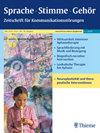精通随机密码疗法:Aphasie的两个案例研究
IF 0.2
Q4 Health Professions
引用次数: 2
摘要
研究问题:利用基于计算机的治疗材料来稳定传统面对面治疗的内容变得越来越重要。通过这种自我干预的方法,可以实现高强度的治疗。在本研究中,回顾了以计算机为基础的治疗的有效性,其中受试者以自我引导的方式重新学习随机生成项目的词汇检索。方法:实验采用商业版计算机化治疗程序(ITS/失语意识,西门子)。由于该研究的先导性,我们选择了两名失语症状截然不同的受试者进行小n设计:受试者a患有急性流利失语并伴有轻度失语;实验对象B患有慢性非流利性失语症并伴有严重的失语症。在17/20次会议中,两名患者一次命名60个项目,这些项目从832个项目大小的池中随机生成。平均每个项目只出现两次(范围:1 - 12)。以计算机为基础的训练在没有额外治疗帮助的情况下完成,但过程受到控制。此外,受试者在学习行为中获得非特异性动机。反应被记录,分类和评估与会话相关的项目得分。结果:从一个疗程到另一个疗程,两名受试者表现出持续而显著的改善。在事前和事后测试中,两名受试者都表现出更多的正确反应。反应变得与目标项目更加相关。此外,长度和频率等词汇参数的影响减弱。这两个案例的好处强调了一个假设,即在不同类型的失语症中,有监督的、基于计算机的、自我进行的词汇检索训练是可行和有效的。本文章由计算机程序翻译,如有差异,请以英文原文为准。
Supervidierte computergestützte Benenntherapie mit randomisierten Items: Zwei Einzelfallstudien bei Aphasie
RESEARCH QUESTIONS: It is becoming more and more important to stabilize the contents of conventional face to face therapy with computer-based therapy materials. With this method of self-conducted intervention, a highly intensive therapy can be realized. In the present study the efficacy of a computer-based therapy was reviewed in which subjects relearned in a self-conducted manner the lexical retrieval of randomly generated items. METHOD: A commercial version of a computerised therapy programme (ITS/aphasiaware, Siemens) was applied in the experiment. Due to the pilot character of the study, a small-n design with two subjects with contrasting symptoms of aphasia was chosen: Subject A suffered from an acute, fluent aphasia with mild anomia; Subject B suffered from a chronic, nonfluent aphasia with severe anomia. Both patients named in 17/20 sessions 60 items at a time, which were randomly generated from an 832 items sized pool. On average every single item was presented only two times (range: 1−12). The computer-based training was completed without additional therapeutic help but the procedure was controlled. In addition, the subjects achieved unspecific motivation in their learning behaviour. Reactions were recorded, classified and assessed with a session-related item-score. RESULTS: From session to session, the two subjects demonstrated a continuously and significantly improvement in performance. In pre- and post-tests, both subjects showed more correct reactions. The responses became more related to the target-item. In addition, the influence of lexical parameters like length and frequency decreased. The benefit for both single cases underlines the assumption that supervised, computer-based, self-conducted training of lexical retrieval is feasible and effective in different types of aphasia.
求助全文
通过发布文献求助,成功后即可免费获取论文全文。
去求助
来源期刊

Sprache-Stimme-Gehor
医学-耳鼻喉科学
CiteScore
0.40
自引率
20.00%
发文量
62
审稿时长
>12 weeks
期刊介绍:
Sprache · Stimme · Gehör ist die Fachzeitschrift für alle, die sich mit Sprach-, Stimm- und Hörstörungen beschäftigen – von Logopäden über Phoniater/Pädaudiologen bis hin zu Sprachheilpädagogen oder Hörgeschädigtenpädagogen. Sie vermittelt gesicherte medizinische Fakten für Ihre Fortbildung – maximaler Praxisnutzen, größtmögliche Unterstützung in Ihrem Alltag und der berühmte Blick über den Tellerrand sind unsere Ziele.
 求助内容:
求助内容: 应助结果提醒方式:
应助结果提醒方式:


